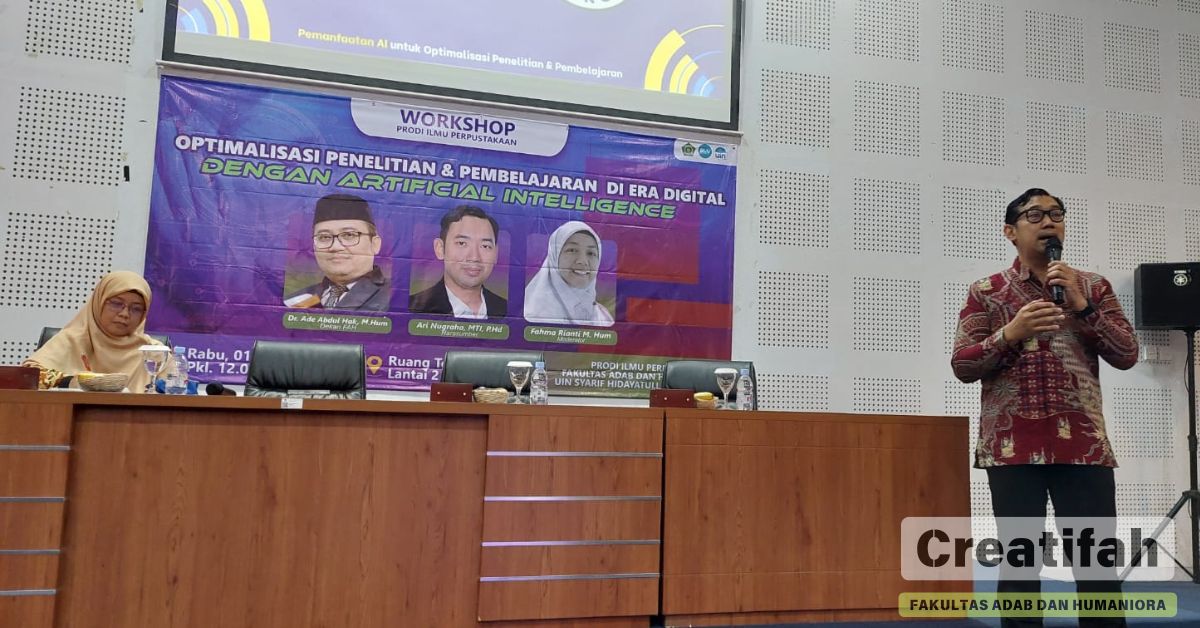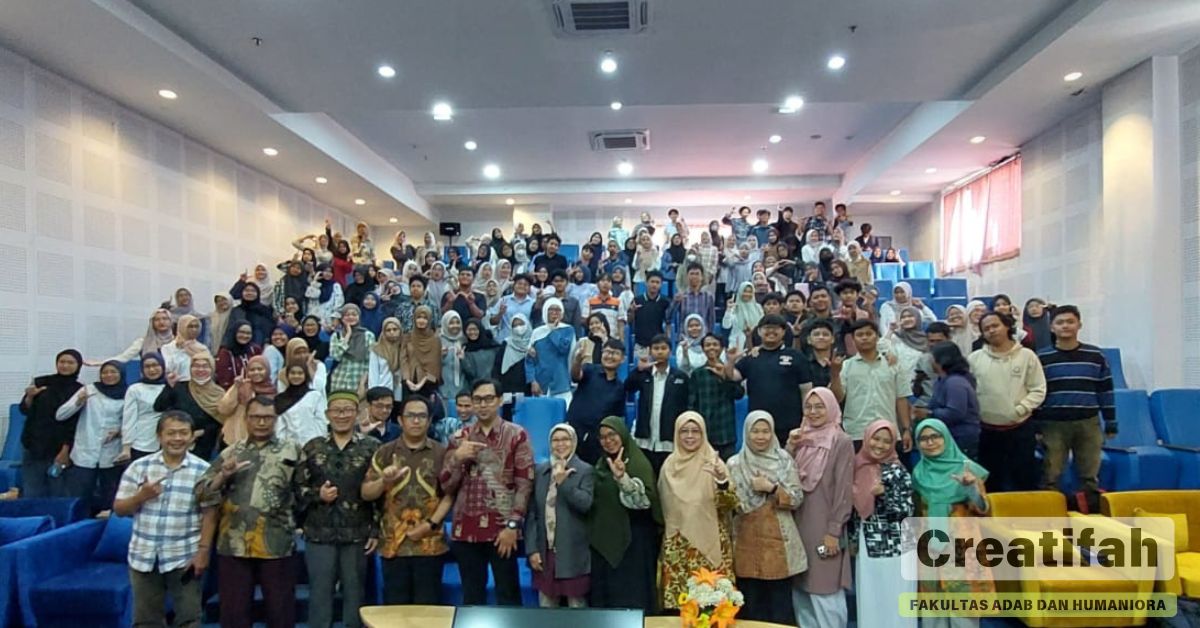FAH Library Science Study Program Holds Workshop on the Use of Artificial Intelligence to Optimize Research and Learning
South Tangerang, FAH News Online – Library Science Study Program, Faculty of Adab and Humanities (FAH) UIN Syarif Hidayatullah Jakarta successfully held a workshop entitled “Optimizing Research and Learning in the Digital Era with Artificial Intelligence”. This activity will take place on Wednesday, October 1 2025 at 13.00 WIB in the Theater Room on the 5th Floor of FAH UIN Jakarta, with high enthusiasm from students, lecturers and the academic community.
The event began with the opening by MC David Gymnastiar, followed by Syahrul reading verses from the holy Koran, singing the national anthem Indonesia Raya and the UIN Jakarta Hymn by Devianita Nadianti, and the closing prayer by Syahrul.
Students Must Master AI as Information Professionals
Remarks were delivered by Dr. Ade Abdul Hak, S.Ag., SS., M.Hum., as dean of the Faculty of Adab and Humanities. In his introduction, he emphasized the importance of Library Science students having added value in the digital era. According to him, it is not enough for students to just be AI users, but must be able to act as information professionals who can introduce and direct the use of AI for society.
Dr. Ade provides an interesting analogy, by equating AI as the concept of qolam in Islam—a tool that records all events—but must still be limited by ethics. He also emphasized that students need to understand strategies for developing effective prompts, so that AI answers match information needs.
In addition, he linked the use of AI to ASK (Anomalous State of Knowledge) theory, where students can use it to formulate queries and meet research needs. In his speech, he also encouraged final semester students to collaborate more actively with lecturers, utilize AI in data processing, both quantitative and qualitative, and produce scientific articles that can be published in indexed journals Sinta to Scopus.
“Students must have the courage to use this technology, not only to make things easier, but also to improve the quality of scientific work and maintain academic ethics,” he said.
Material: Types of AI, Use in Research, to Ethics
The core session of the workshop presented Ari Nugraha, MTI., Ph.D. as a resource person with Fahma Rianti, M.Hum. act as moderator. In his delivery, Ari explained various topics surrounding the development of AI that are relevant for research and learning.
He explained the types of AI such as:
Generative → generates new content based on user prompts.
Discriminatory → performs data classification automatically.
Agentive → AI capable of working alone based on instruction sequence.
Ari also introduced popular AI models such as GPT, Vertex (Google), Claude (Anthropic), LLaMA (Meta), and DeepSeek, along with derivative products such as ChatGPT, Gemini, Claude.ai, and DeepSeek Chat.
However, he did not turn a blind eye to various generative AI issues, including bias due to data training, privacy, ethics, the digital divide, as well as the hallucination phenomenon where AI makes up answers.
In the context of research, Ari emphasized that AI can be used to:
- Classification of texts with discriminatory AI.
- Helps develop ideas using chatbots/virtual assistants.
- Research gap analysis.
- Cross-format data conversion (voice to text, image to text).
Meanwhile, in learning, AI can function to personalize material, help the learning process, monitor learning outcomes, and detect plagiarism. Ari also touched on the development of AI Agents that work automatically in data flows, such as n8n, CrewAI, Glide, IBM Watson, and Google Vertex.
“AI is an assistant, not a substitute for humans. "Our job is to use it critically, not hand over all the work to the machine," stressed Ari.
Discussion and Questions and Answers
During the discussion session, one participant, Dannis, asked about the most relevant AI tools for research and the challenges of using them. Responding to this, Ari said that one AI that can be used is Perplexity, because it supports searching for references effectively. However, the biggest challenge is ethics, especially regarding the management of research data which must be kept confidential and anonymized.
Closing
The workshop closed with the presentation of a certificate to the resource person by the dean, followed by an invitation to all participants to practice the knowledge gained in research, thesis writing, or other academic development.
This activity is proof of the commitment of the UIN Jakarta Library Science Study Program to continue to present academic programs that are relevant to current developments, as well as equipping students with critical and ethical digital literacy.
Oeh: Muhammad Suyuthi Alkautsar
Documentation:



